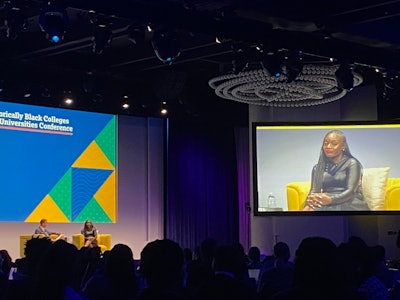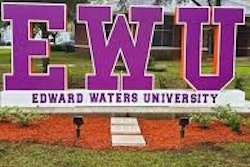NEW YORK –
The second day of the College Board’s Historically Black College and University (HBCU) Conference: "A Dream Deferred" opened with a candid discussion about what it takes to bring more young Black and Brown individuals into the fields of science, technology, engineering and mathematics (STEM), and how Black leaders in these fields are tangibly transforming the lives and livelihoods of the communities they come from.
 Steve Bumbaugh, senior vice president of College and Career Access at the College Board, sits in conversation with Dr. . Kizzmekia S. Corbett-Helaire, assistant professor of Immunology and Infectious Diseases at Harvard University and leading researcher behind the Moderna COVID-19 vaccine.
Steve Bumbaugh, senior vice president of College and Career Access at the College Board, sits in conversation with Dr. . Kizzmekia S. Corbett-Helaire, assistant professor of Immunology and Infectious Diseases at Harvard University and leading researcher behind the Moderna COVID-19 vaccine.
Institutions, including medical and scientific institutions, have treated Black and Brown citizens “terribly over the centuries,” said Corbett-Helaire, which spreads their understandable mistrust.
“I do things differently than what’s typical of a scientist because we just have to. Because that trust is gone, there is no way to rebuild it without communication,” said Corbett-Helaire. “That type of communication has to be intentional, almost so direct that it’s not a wide conversation but targeting conversations.”
Throughout the day, leaders and educators came together to try and bridge the divide between secondary and post-secondary education, creating solid pathways for Black and Brown students to walk toward credentials that provide careers and economic mobility.
A 2023 report by the Annenberg Institute for School Reform, studying almost 1.2 million Black students who took the SAT between 2004 and 2010, revealed that students who enrolled at an HBCU were 14.6 percentage points more likely to graduate than their counterparts. Black students who enrolled at non-HBCU four-year institutions were 24 percentage points less likely to complete a bachelor’s degree in six years or less.
“The challenge is, a lot of the stories people share about their perceptions on why Predominately White Institutions (PWIs) are better are factually inaccurate,” said Sekou Biddle, vice president of advocacy at the United Negro College Fund (UNCF), a scholarship organization which supports private HBCUs across the country. “HBCUs graduate students at significantly higher rates and prepare them for success in life.”
Participants at the conference were hungry for ways that HBCUs could connect with their K-12 programs, and they listened intently as Dr. Evelyn Edney shared her experiences as head of school at the Early College School (ECS) at Delaware State University (DSU), a 7-12 system that sends just under 65% of its graduates straight into college at DSU. ECS’s enrollment is built through lottery, and starting as sophomores, students are able to join college-aged students in college-level courses on the DSU campus.
“The power of place, being there, taking college courses sitting next to bearded people,” said Edney with a laugh, “That means more than dual credit. Students become very familiar with the environment—they will finish at home.”
Dr. David Thomas, president of Morehouse College in Atlanta, and Dr. Damara Hightower Mitchell, provost and vice-president of Voorhees University in Denmark, SC, said their schools offer summer programming opportunities, giving students across the U.S. a chance to be on their campuses and explore what it means to be in a place built for them.
 Sekou Biddle, vice president of advocacy at the United Negro College Fund; Dr. Evelyn Edney, head of school at Early College School at Delaware State University; Dr. Damara Hightower Mitchell, provost and vice-president of Voorhees University; Dr. David Thomas, president of Morehouse College.
Sekou Biddle, vice president of advocacy at the United Negro College Fund; Dr. Evelyn Edney, head of school at Early College School at Delaware State University; Dr. Damara Hightower Mitchell, provost and vice-president of Voorhees University; Dr. David Thomas, president of Morehouse College.
Corbett-Helaire said her experience of the silos of post-secondary institutions became very clear during COVID, when she would travel through Mission Hill, a majority Black neighborhood in Boston, to get to her lab. It’s why she deliberately partners with HBCUs to intern student scientists over the summer. HBCU students, she said, come to her lab with an innate knowledge of “what Black people bring to academic spaces.”
“Despite all that I can do as their principal investigator and boss, there’s something I feel the HBCU and Black experience gives to students they can bring into the environment that’s more valuable than anything else,” said Corbett-Helaire. “I’m not just training scientists—I’m training people who go out into the world with worldly experience. And most of the world is Brown.”
Liann Herder can be reached at [email protected].



















